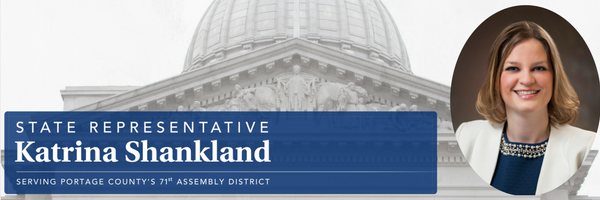 |
|
State Capitol Report
Friends and Neighbors,
Summer is finally here! With the warm weather comes music in the park, cookouts, camping, hikes, farmers markets, and so much more. I hope you’ve had a chance to get outside and enjoy all that Portage County has to offer. Thanks to Wisconsin’s continued success with vaccination efforts, with more than 50% of Wisconsinites receiving at least one dose of the COVID-19 vaccine, we can enjoy our lives with a renewed sense of ease.
I am writing to share information and updates on the legislative session, including updates on the state budget and bipartisan bills I’ve been working on with my colleagues in the Capitol.
Wisconsin still remains number two in the nation for percent of COVID-19 vaccine supply used. Infections continue to decrease, current hospitalizations are reaching year-long lows, and over 50 percent of eligible Wisconsinites have received at least one dose of the COVID-19 vaccine.
Now that I am fully vaccinated, it has been great to be at so many community events around the district. I’ve helped cook Sib Pab meals at Farmshed with Lieutenant Governor Mandela Barnes, chatted about water quality and the Stewardship Program at Schmeeckle Reserve with community members and members of the Joint Finance Committee, toured Albertson Hall at UW-Stevens Point with Chancellor Gibson, toured the Boys and Girls Club of Portage County with State Superintendent of Public Instruction Jill Underly and local education leaders, and honored businesses for their recognition by the Portage County Business Council. I also enjoyed celebrating Pride Month and Juneteenth with community members in June.
There is so much opportunity for legislative action to help the people of the 71st Assembly District. I have introduced several pieces of bipartisan legislation over the past few months, all aimed at finding meaningful solutions to the issues we face as a state. This includes a bipartisan highway safety bill to protect roadside responders, a Work Share bill that would expand funding and eligibility for the program, and a UI contribution bill that would ensure employers wouldn’t face a contribution increase this year. In addition to these bills, I was also honored to introduce a bipartisan bill which would ensure the experiences of Hmong Americans and APIDA are included in the school curriculum. More information about these proposals can be found below.
I am happy to report our state remains on the right track as our economy recovers from the fallout of the past year, yet there is still a great deal of work to be done to make sure we continue to bounce back from the COVID-19 pandemic. I am determined to continue my work in the legislature that is centered on common ground and getting results.
Please feel free to contact me with any thoughts, questions, ideas, or concerns. To stay informed, feel free to check out my Facebook page and website for updates, including news stories and updates about the legislative session.
Thank you for following along, and please let me know how I can best serve you. Your voice is very important to me!
Yours,

Katrina Shankland
State Representative
71st Assembly District
|
|
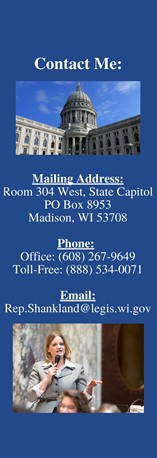
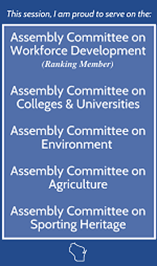
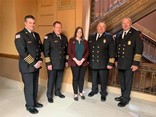


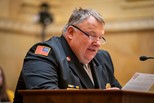


|
|
Biennial Budget Update
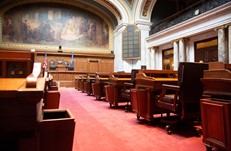
Click here or on the image above to view my full statement on the State Budget
When Governor Evers debuted his budget proposal, I was pleased with the vision he laid out. His budget met the moment and reflected the needs of our communities, making meaningful investments that would have made a huge difference for individuals, families, businesses, schools, and communities across Wisconsin. With the welcome news of a $4.4 billion projected surplus, we also had more money available than any other state budget cycle in recent memory. This meant we could have accomplished everyone’s legislative priorities: we had enough money to invest in schools, infrastructure, healthcare, and deliver a tax cut.
We could have come together to pass a budget that we could all support, addressing our most pressing needs and uplifting communities across our state with critical and strategic investments. Unfortunately, the Joint Finance Committee removed hundreds of provisions in the state budget on their first day of votes, from expanding BadgerCare to raising the minimum wage to reducing prescription drug prices and more.
This state budget should have funded our public schools with an increase to our classrooms instead of providing our schools with flat budgets and increased costs. The majority of the K-12 school funding in this budget is school funding in name only, meant to meet the federal government’s maintenance of effort requirements. While it’s important that we meet these requirements, this funding to buy down the property tax levy is not money that can be spent in the classroom.
To put a finer point on it, on May 27, the Joint Finance Committee voted to approve less than 10% of Governor Evers’ proposal for school funding, while also jeopardizing $2.3 billion in federal funding, failing to meet the state’s maintenance of effort. The federal government requires that funds for K-12 schools and higher education appropriated in our state budget are equal to the funds spent in the 2016-2018 fiscal years to be eligible for increased federal funding. To compensate for this shortfall, the Joint Finance Committee voted to buy down the property tax levy, therefore being able to claim they met the state’s maintenance of effort so we are still eligible for the federal funds.
These one-time federal funds are meant to address learning loss, remediation, COVID-19 mitigation, and mental and social-emotional health. They are not meant to supplant state funding, and the state education funding in name only won’t go into our classrooms.
In the Stevens Point Public School District alone, the flat funding in the state budget coupled with increasing costs will result in a structural deficit and could lead to an operating referendum. Instead of asking voters to fund our schools via referenda, we should fund our schools through the state budget in the first place. Pushing these decisions to the local level will lead to even more inequity in our public schools.
In addition to education, this budget failed to expand BadgerCare, which would have saved our state $1.6 billion and would have given an additional 90,000 Wisconsinites healthcare coverage. This budget also did not adequately address broadband coverage, opting to borrow $125 million to fund broadband expansion instead of accepting Governor Evers’ proposal of $200 million in state revenues.
I believe we are capable of more than this. I know from experience that bipartisan compromise is possible, and we have urgent issues to address, from affordable healthcare to water quality and economic security. I am disappointed that the budget as amended squandered this momentous opportunity to fairly fund our schools, support workers and businesses, invest in infrastructure, and balance the budget.
Throughout the budget process, I advocated persistently for the inclusion of important issues for our community. While I was hoping to be able to support the budget, this state budget leaves too much to chance for our local public schools, and that’s why I voted no. I look forward to the opportunity to keep advocating for the funding and opportunities we need to strengthen communities across Wisconsin and work with my colleagues in both parties to ensure that our state is on a strong path forward. In the coming months, I’ll be introducing legislation that makes up the gaps in this budget and truly supports the people of Wisconsin.
Governor Evers Announces Broadband Expansion Grants
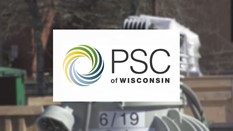
Click here or on the image above to see the Governor’s full statement on the grants
On May 18, Governor Tony Evers announced that he will invest $100 million from the American Rescue Plan Act (ARPA) funds into broadband grants administered by the Public Service Commission (PSC). The PSC will award funding through a reimbursement process similar to the current broadband expansion grant program. Under guidance from the U.S. Treasury, eligible broadband projects are expected to:
- Serve unserved or underserved households and businesses
- Meet or exceed upload and download speeds of 100 Mbps
- Prioritize affordability options
- Avoid investment in locations that have existing agreements to build reliable service
The broadband expansion grant program has already awarded over $73 million in broadband grants over the past eight years. Yet, nearly 400,000 Wisconsinites still do not meet the Federal Communications Commission's standards for broadband. While we still have a long way to go, I am encouraged by the governor's dedication to addressing this issue with these needed investments.
Applications for the ARPA Broadband Access Grants are due on July 27, 2021. The PSC expects to make award decisions in early fall. Approved projects must be completed by December 31, 2024, and there is no minimum or maximum amount of funding an applicant may request.
Click here for forms, instructions, and information on how to apply for the new grants
Superintendent of Public Instruction Jill Underly Visits Stevens Point
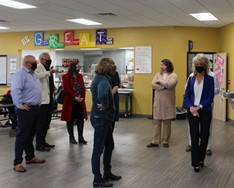
On May 10th, I joined State Superintendent of Public Instruction Jill Underly and Stevens Point Area Public School District and school board leaders on a tour at the Boys & Girls Club of Portage County to see the Berard Center. The Boys & Girls Club of Portage County has demonstrated great leadership in our community throughout the pandemic, and I was glad to join Superintendent Jill Underly to share with her the importance of investing in our after school programs.
We were also joined by the Executive Director of the Boys and Girls Club, Kevin Quevillion. He emphasized that many children in our state spend almost as much time in after school programs as they do in school, especially in the summer months. This past year underscored that after school programs are more than just a place for our children to receive an education -- they are also essential to many working families. The Boys and Girls Club offers enriching and educational activities while parents are hard at work supporting their families, and we appreciate their contributions to workforce development and the economy, in addition to supporting the nurturing and development of our kids.
UI Contribution Rate Bill
On June 10, I introduced legislation with my colleagues Rep. Andraca, Rep. Doyle, Rep. Meyers, and Rep. S. Rodriguez to prevent a rate increase on unemployment insurance contribution rates for employers. Rather than basing the unemployment tax rate on the funds in the Unemployment Trust Fund, this bill would keep the lowest unemployment insurance tax in place through the year 2023, preventing a projected rate increase going into 2022. After the chaos of the past year, with uncertainties in the supply chain and consumer demand, this bill will give businesses the peace of mind they need to recover and grow. With over half of the state being vaccinated and an expected $4.4 billion in revenues, any shortfalls in the unemployment trust fund will be addressed given the current economic forecast.
Just a few weeks later, my legislative colleagues introduced a similar bill to prevent a rate increase, the only difference being that the bill hinged on the passage of the state budget.
This bill was unanimously passed by the State Senate and Assembly in late June, and I was happy to support it. It now heads to the Governor’s desk where I am confident it will be signed into law. Small businesses are counting on us to provide relief, security, and bipartisan solutions, and I was glad to see this bill swiftly pass through the Legislature.
BadgerCare Expansion
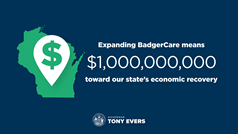
Click here or on the image above to see the governor’s full statement on the special session.
On May 6, 2021, the Joint Finance Committee voted to remove the BadgerCare expansion from the state budget, in addition to several hundred other provisions. This was despite an analysis conducted by the nonpartisan Legislative Fiscal Bureau which found that taxpayers could save $1.6 billion in state dollars in two years. Thanks to greater incentive funding from the federal coronavirus relief plan, we would be eligible for this higher level of funding if we expand BadgerCare.
Following their action, Governor Evers declared a special session to expand BadgerCare and invest $1 billion in local economic development projects. Included in these projects was a $5 million investment in The Food + Farm Exploration Center in Central Wisconsin, $200 million to increase the existing broadband expansion grant program, and a $50 million investment to revive the Verso paper mill in Wisconsin Rapids. Unfortunately, on May 25, 2021, Republican legislators gaveled the special session out without taking any action on BadgerCare. While I am very disappointed, I will continue to advocate for the BadgerCare expansion. Shortly after the session was gaveled in and out, Senator Erpenbach introduced the governor's proposal for BadgerCare expansion in the form of legislation. I was proud to sign on as a co-sponsor of this bill so we can provide healthcare to over 90,000 Wisconsinites and fund critical infrastructure projects with the state tax savings from the expansion. Everyone deserves affordable access to health care and the security and peace of mind it provides.
June Dairy Month
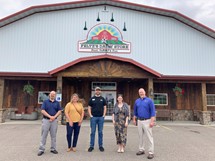
June is Dairy Month, and it was great to experience the Feltz Family Farm's June Dairy Drive-Thru! Thanks to them for hosting and making sure so many families can celebrate Dairy Month!
In May, I also visited Feltz Family Farms and Dairy Store with DATCP Secretary-designee Randy Romanski, WEDC Deputy Secretary Sam Rikkers, Jeff Anderson, Wisconsin Department of Tourism, and Sara Brish, Stevens Point Area Convention and Visitors Bureau Executive Director.
|
Protecting First Responders from Reckless Drivers
This session, I reintroduced legislation I’ve been working on since August 2018. I first became engaged with the issue of roadside safety for first responders after a reckless driver crashed directly into a fire truck in Waupaca as they were responding to an incident, and Amherst Fire Department Assistant Chief Brian Swan brought me down to the station to talk about it and how the Legislature might be able to help. Since then, I have worked with him, Amherst Fire Chief Victor Voss, my legislative colleagues from both parties, and roadside responders and stakeholder groups from across the state to craft and advance this legislation.
Assembly Bill 297 would strengthen penalties for traffic violations like reckless driving in areas where emergency or roadside response vehicles are present and personnel are at risk from traffic. This part of the bill would also protect linemen, utility workers, tow truck drivers, and all first responders. The legislation would also create an emergency response zone and allow first responders to slow down traffic in the emergency zone. Cell phone use while driving is also banned within the zone, and like a construction zone, fines would double for speeding, using a cell phone, or for reckless driving. Finally, the bill requires the DOT to educate the public about these changes and the risks associated with failing to move over, reduce speed, and using their cell phones in emergency response areas.
I appreciate working with my Republican colleagues Rep. Amy Loudenbeck, Rep. Todd Novak, Rep. Jon Plumer, and Sen. Joan Ballweg to improve highway safety and protect our roadside responders. Last legislative session, this bill passed the Assembly but failed to pass the Senate once the pandemic hit. I am proud to say this bill passed the Assembly on June 22 and now heads to the Senate for a final vote.
Click here to view coverage from the Wisconsin Examiner.
Click here to view coverage from the Point/Plover Metro Wire
Click here or on the image below to view my full statement on the bill.
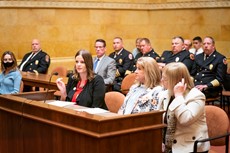
COVID-19 Vaccination Update
According to the latest updates from the Wisconsin Department of Health Services, 50.5% of the state population has received at least one vaccine, with 47.6% comprising those who have completed the vaccine series. Wisconsin has distributed over 5,600,000 vaccine doses. As a result of our consistently high levels of vaccine administration, businesses are reopening in full, schools are back to in-person learning, and life is returning to pre-pandemic normalcy. It is important to remember that vaccines are the most essential tool we have to mitigate the spread of COVID-19 and its variants. It's easier than ever to sign up for an appointment and receive a vaccine.
If you have any questions regarding the safety, effectiveness, or potential side effects of the vaccine, click here to be taken to the Wisconsin DHS Vaccine landing page.
You can schedule an appointment to receive a vaccine on the Wisconsin DHS website by clicking here.
You can find a vaccinator near you by going to www.vaccines.gov/search
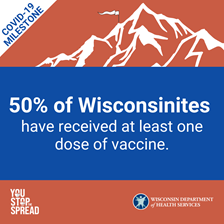
Bipartisan Hmong and Asian American Instruction Bill Introduced
On May 6, I was thrilled to introduce bipartisan legislation with my colleagues Rep. Snyder, Rep. Hong, Rep. Tusler, Sen. Wimberger, and many more to require public schools to include the experiences of Hmong Americans and Asian Pacific Islander Desi Americans in their educational goals for human relations. This is a bill I’ve always worked on in the Legislature, and I’m excited the bill has such strong early support this session so we can push for a public hearing and vote.
With the celebration of Hmong Heritage Month in April and Asian Pacific Islander Desi American Month in May, we honor and recognize our valued neighbors and community members. Wisconsin is home to the third largest population of Hmong Americans of any state in the nation, and the Asian Pacific Islander Desi American (APIDA) population in our state has risen 82% since the 2000 Census.
In April 2020, the Stevens Point Area Public School District School Board voted unanimously to support this bill, and I’m proud that the district is already including the Hmong and Asian American experiences in their curriculum. This is one way we can honor their contributions, legacy, and history, and celebrate their culture and experience, and I hope to see this bill become law so every public school includes the Hmong and Asian American experiences in their curriculum.
You can see the full story from WSAW by clicking here.
Click here or on the image below to view my full statement.

DWD and Work Search Requirements
The Wisconsin State Legislature has reinstated the work search requirement for unemployment benefits. As of May 23, 2021, claimants looking to receive state unemployment benefits are now required to complete four job search activities for each week that they file. This rule was reinstated by the Legislature’s administrative rules committee, which passed by a 6-4 vote. Claimants receiving PUA benefits will not be prompted to file work search contacts in their weekly claims. Additionally, claimants expected to return to work within 8 weeks of their initial claim may file for a waiver for the work search requirement, and may also have it extended to a 12-week waiver. If you are currently receiving UI benefits, looking for work, or trying to navigate the new Work Search requirements, the Department of Workforce Development’s website has plenty of resources to help.
Click here to view a video from the Department of Workforce Development on the updated unemployment filing requirements.
You can also access FAQs regarding the work search update by clicking here.
The Job Center of Wisconsin is a great resource for updated job searches and assistance with creating or editing resumes.
Veterans are encouraged to explore resources in their community and opportunities to enhance their career. Click here to be taken to DWD’s Veterans page.
The Job Center of Wisconsin also hosts virtual workshops for interviewing and application tips, personal branding, and much more. Click here to find and register for upcoming workshops.
The federal government offers training programs for individuals who are considered eligible under the Workforce Innovation and Opportunity Act (WIOA).
Click here to learn more about these training programs and find out if you are eligible.
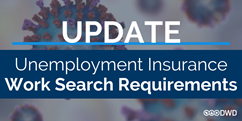
Aboveground Storage Bill
On May 5, I reintroduced a bipartisan bill which would update current regulation on aboveground storage tanks to protect public health and safety. This is an issue I’ve heard about from passionate fire chiefs. The Wisconsin Department of Agriculture, Trade and Consumer Protection (DATCP) regulates storage tank systems in Wisconsin. The program existed in the Department of Commerce before its subsequent transfers to the Department of Safety and Professional Services (DSPS) and DATCP. The Department has regulated storage tank systems, including aboveground storage tank systems, for decades. Due to these reorganizations, state statutes have neglected to keep pace with storage tank systems regulations. In 2017, DATCP conducted a report which found that it lacked specific statutory authority to regulate aboveground storage tanks between 110 and 5,000 gallons. Two years after the publication of this report, the Department ceased regulation on October 1, 2019.
This created safety and environmental issues as DATCP’s regulatory framework no longer met the fire prevention and environmental protection standards outlined by the EPA. Additionally, 18,000 storage tanks which are 5,000 gallons or less are no longer regulated by DATCP in Wisconsin. It is estimated that 22% of these tanks are non-compliant under the previous regulatory framework, which can lead to an increase in spills and leaks. One such incident happened in Newington, Connecticut in 2017 when two 4,000 gallon storage tanks leaked over 14,000 gallons of diesel fuel, which cost the state $2.5 million in remediation.
Working with my Republican colleagues, we reintroduced legislation to allow DATCP to regulate storage tanks of 110 gallons and higher and more accurately characterize certain terms in law. The bill has been introduced in the legislature as Assembly Bill 384 and was referred to the Committee on Consumer Protection where I am hopeful it will receive a public hearing and a vote. I’m proud that it’s a bipartisan bill and that my office worked closely with DATCP and fire chiefs to draft it.
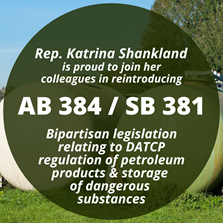
UI Work-Share Programs Bill
On May 3rd, I introduced legislation with my colleagues Rep. Sinicki and Rep. Hesselbein to strengthen the state’s Work-Share program. Work-Share is a popular, effective short-term compensation initiative. This program provides an alternative to layoffs so that employers can continue to pay employees during downturns. The Work-Share program offers benefits for unemployment insurance to cover the lost hours. Throughout the pandemic, many employers used the Work-Share program to minimize layoffs during the pandemic. It can also be used to help employers rehire their already laid-off workers.
Under the American Rescue Plan, payments are extended for unemployment benefits to September 6, 2021. This bill would update the Work-Share provisions under state law to comport with federal law and allow employers participating in the Work-Share program to participate for 12 months as opposed to the current 6 months in a 5-year period. I believe this initiative will continue to support both employers and employees as hiring ramps up and we all work to get back to a sense of normalcy. I will continue to prioritize our workforce and workforce development so that our businesses stay afloat and workers are appropriately compensated.
For more information about how to utilize the state’s Work-Share program, click here.
|
Additional Information & Resources
- The Department of Health Services (DHS) website is updated regularly with guidance related to COVID-19 best practices and information on confirmed cases
- Information from DHS about COVID-19 vaccines can be found here
- The CDC's website also has information and guidance on COVID-19
- You can find COVID-19 information, updates, and resources from the governor's office and all of our state agencies here
|
- If you are facing financial hardship, 211 Wisconsin can connect you with resources and information in your area for assistance
- The Department of Workforce Development has a site listing numerous resources for individuals struggling with financial hardship here
- The Department of Workforce Development also has a helpful page for navigating the many unemployment programs available in Wisconsin here
- Resources for small businesses can be found on the Wisconsin Economic Development Corporation website
- If you are having trouble accessing your unemployment benefits, you can contact my office for assistance at Rep.Shankland@legis.wisconsin.gov or (608) 267-9649
|
- This is a stressful time for many of us. If you are feeling overwhelmed, anxious, or scared, please feel free to call Distressline at 1-800-985-5990 or text TalkWithUs to 66746
- Visit the Resilient Wisconsin homepage for additional resources and tips for practicing self-care, staying connected, and reducing stress
- This video from Community Foundation of Central Wisconsin discusses how the stages of grief can apply to the COVID-19 pandemic.
|
|
Thank you for following along. I look forward to staying in touch!
Click to view this email in a browser
Click here to unsubscribe.
|
|
|
|